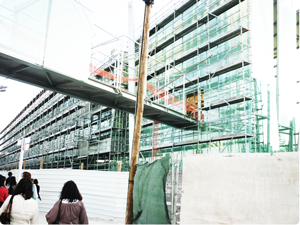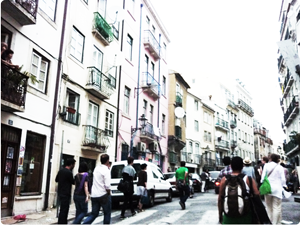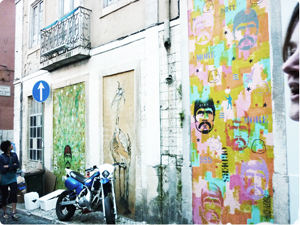

Urban (ir)rationalities:
Between global dynamics and local collective actions
|
CONFERENCE |
RETREAT |
Organized by the Centre for Social Studies (Centro de Estudos Sociais, CES), University of Coimbra, Portugal
 |
 |
 |
 |
Conference context
The set of irrationalities generated by global capitalism, especially if considered from the perspective of the well-being of citizens, affects both the global macroeconomic context as well as local urban systems. Within this context, Portugal is being affected by a crisis comprised of an interlacing of a set of crises of various natures and spatiotemporal frameworks. The short-term financial crisis and the medium-term global economic crisis join a political crisis and a long-term cultural and identity crisis, all of which call into question Portugal's place in the world and the very structure of governance and (re)production of society.
The event intends to reflect on Portugal as a metaphor. Taking as its starting point a small, semi-peripheral country and former colonial power in a crisis situation, we will reflect on the need to reinvent relations between communities, countries and institutions, which implies new forms of governance to conceive and implement policies and to (re)build society and the city. The territory for this reflection is the Lisbon Metropolitan Area, as a laboratory of experimentation for an emerging set of practices that illustrate this metaphor.
Issues addressed
The three-day conference will feature roundtable plenary sessions involving invited presenters from academia, government and non-governmental organizations, as well as site visits to areas that illustrate the themes of the roundtables. These will be organized within three overarching themes:
• Facing multiple crises: Portugal as a metaphor
• City cultures in a post-colonial context
• Micro-actions building the city
Through the conference and the visits, a series of issues will be addressed:
• How does global capitalism generate irrational urban dynamics (e.g., dynamics of abandoned and hyper-valorizated areas in the same territory, accompanied by dynamics of ex nouvo expansion in ‘unqualified’ territories)?
• In the context where countries (and cities) feel compelled to join networks and supranational institutions to survive, what are the implications arising from the constraints and imperatives imposed by the outside which are visible in the urban system? How do these constraints and imperatives contribute to generating greater efficiency and effectiveness aspirations (rationality) or, conversely, create new urban irrationalities?
• In a time of crisis, in which the capacity of public policies to direct action is reduced, will policies become more flexible and permeable to absorb proposals originating in society?
• In the context of the current crisis, are new forms of governance emerging that are more open to accepting and living with conflict, instead of thinking of citizen participation as merely an instrument of social pacification?
• In what way and to what extent is the collective construction of the city/society responding to the void left by public policy?
• In the Lisbon Metropolitan Area, what are the visible aspects of the urban fabric, the invariant transformations, of the relations between Portugal and the former colonized countries, and between the Portuguese and the communities of these countries?
What is INURA?
The International Network of Urban Research and Action (INURA) is a non-governmental and non-profit organization that brings together theorists and practitioners sharing a common, critical attitude towards contemporary urban development. The Network consists of activists and researchers from community and environmental groups, universities and local administrations who wish to share experiences and to participate in common research. The core purpose of the Network is to develop and promote the interaction of social and environmental urban movements with research and theoretical analysis. Examples of the issues that Network members are involved in include: major urban renewal projects, the urban periphery, community-led environmental schemes, urban traffic and transport, inner city labour markets, do-it-yourself culture, and social housing provision. In each case, the research is closely tied to, and is a product of, local action and initiative.